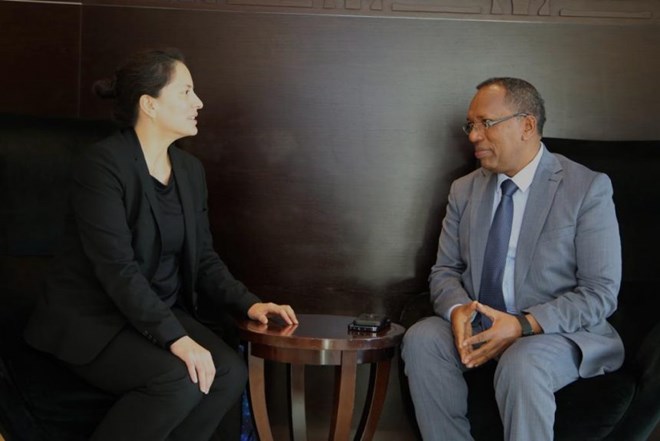
Tuesday March 21, 2023

Mogadishu (HOL) - The International Monetary Fund (IMF) has announced that Somali authorities have reached a staff-level agreement for the fifth review of Somalia's Extended Credit Facility (ECF) arrangement. Led by Laura Jaramillo, the IMF team stated in a press release that Somalia still faces acute food insecurity in some areas due to persistent drought. Despite this, Somalia has made progress under the ECF-supported program and towards the HIPC Completion Point triggers, which appears achievable by the end of 2023.
However, Somalia's GDP growth estimate for 2022 was downgraded by a quarter percent to 1.7 percent, and projections for 2023 were downgraded due to the prolonged drought and subdued remittance inflows. Average inflation reached 6.8 percent in 2022 due to high food and fuel prices and is expected to decline to 4.2 percent in 2023 as commodity prices recede.
The IMF expects external budget support to remain crucial, even though Somali authorities have committed to improving revenue collection in 2023. The IMF expressed satisfaction with the continued fiscal reforms, including the new income tax law and increasing revenue collection from large businesses, especially the telecom sector. Public financial management has been strengthened, and improvements are ongoing on integrating all employees in the payroll system, fiscal reporting, procurement, and management of non-financial assets.
Dr. Elmi Mohamud Nur, Somalia's Minister of Finance, welcomed the IMF's report on the assessment of the 5th review process regarding the requirements of the ECF Program for Debt Relief in Somalia. The IMF said the Central Bank of Somalia (CBS) is advancing institutional governance and financial sector reforms, with the progress made in improving the financial sector infrastructure.
Somali authorities have taken impressive steps to strengthen the strategic and oversight role of the Inter-Ministerial Concessions Committee over government contracts and concessions. They also reached debt relief agreements with most Paris Club members and the Kuwait Fund for Arab Economic Development (KFAED) and continue to seek agreements with other bilateral creditors.
The IMF emphasized that timely financing and capacity development support from development partners are essential for successfully implementing the authorities' reform strategy. Contributions from Somalia's partners to the Somalia Country Fund are critical to ensure the smooth delivery of IMF technical assistance to support the goals of the ECF-supported program and the HIPC Initiative.
In March 2020, Somalia
became eligible for debt relief under the HIPC Initiative, paving the way for the government to significantly reduce its external debt and create fiscal space for investment in development priorities. Since then, Somalia has made steady progress in meeting the criteria necessary to reach the HIPC Completion Point, which would lead to the cancellation of a significant portion of its external debt.
The Completion Point entails the complete cancellation of a country's eligible debt to the IMF, World Bank, and African Development Bank. For Somalia to reach the Completion Point, it must meet several prerequisites, including implementing macroeconomic and structural reforms, poverty reduction and social development policies, and public financial management improvements.
Somalia has made significant progress towards the Completion Point milestone. In March 2020, the IMF Executive Board completed the first review of Somalia's Staff-Monitored Program (SMP) and approved a three-year Extended Credit Facility (ECF) of $395.5 million. The approval of the ECF signalled the IMF's endorsement of Somalia's reform efforts and commitment to improving its economic prospects. Somalia has also made significant progress in implementing the requirements of the Heavily Indebted Poor Countries (HIPC) Initiative. In June 2021, the World Bank announced that Somalia had achieved the necessary conditions to qualify for debt relief under the HIPC Initiative. The debt relief is expected to provide Somalia with financial resources to address its development priorities, such as education, health, infrastructure, and social services.
The Somali government expects to reach the completion point by the end of the fourth fiscal quarter in 2023.